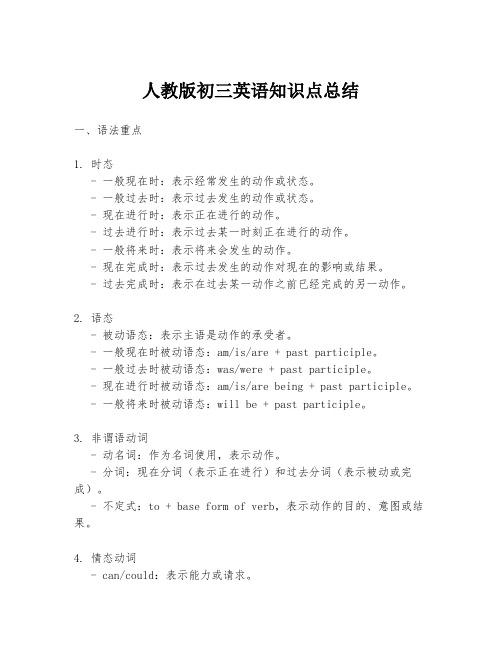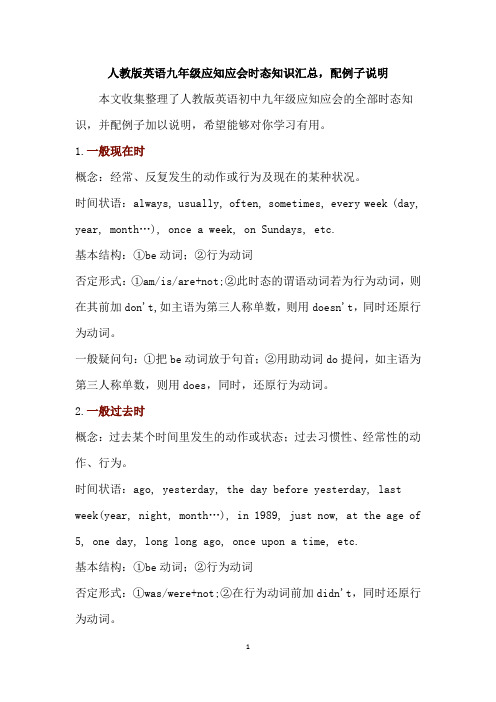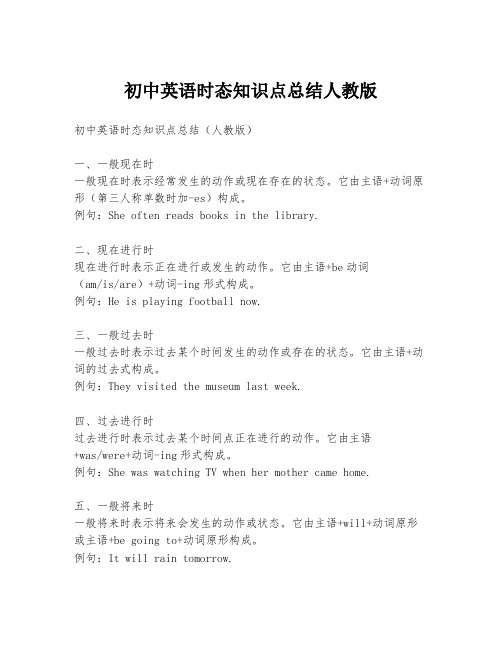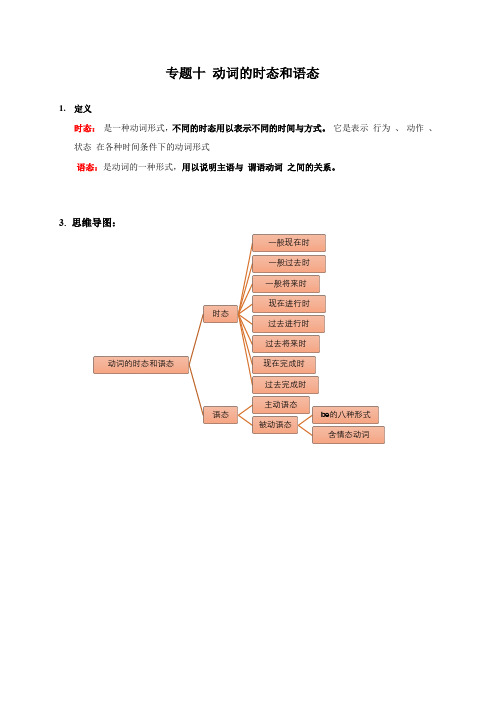人教版中考英语中考英语总复习动词的时态X知识点总结
- 格式:doc
- 大小:54.00 KB
- 文档页数:9

人教版初三英语知识点总结一、语法重点1. 时态- 一般现在时:表示经常发生的动作或状态。
- 一般过去时:表示过去发生的动作或状态。
- 现在进行时:表示正在进行的动作。
- 过去进行时:表示过去某一时刻正在进行的动作。
- 一般将来时:表示将来会发生的动作。
- 现在完成时:表示过去发生的动作对现在的影响或结果。
- 过去完成时:表示在过去某一动作之前已经完成的另一动作。
2. 语态- 被动语态:表示主语是动作的承受者。
- 一般现在时被动语态:am/is/are + past participle。
- 一般过去时被动语态:was/were + past participle。
- 现在进行时被动语态:am/is/are being + past participle。
- 一般将来时被动语态:will be + past participle。
3. 非谓语动词- 动名词:作为名词使用,表示动作。
- 分词:现在分词(表示正在进行)和过去分词(表示被动或完成)。
- 不定式:to + base form of verb,表示动作的目的、意图或结果。
4. 情态动词- can/could:表示能力或请求。
- may/might:表示可能性。
- must:表示必须或强烈义务。
- should/ought to:表示建议或应当。
5. 句子结构- 简单句:一个主语和一个谓语。
- 并列句:使用并列连词连接两个或多个简单句。
- 复合句:包含一个主句和至少一个从句。
- 定语从句:修饰名词或代词的从句。
- 状语从句:表示时间、地点、原因、条件、结果等。
二、词汇与短语1. 常见词汇- 描述人物特征的形容词:kind, honest, creative, etc.- 描述日常活动的动词短语:clean up, take out, turn off, etc.- 描述情感和情绪的名词:happiness, sadness, anger, etc. - 描述天气的词汇:sunny, rainy, windy, etc.2. 短语搭配- 动词短语搭配:finish doing, stop to do, remember to do, etc.- 形容词与介词的搭配:afraid of, interested in, good at, etc.- 常用口语表达:What's up?, How about…?, It's up to you, etc.三、阅读理解技巧1. 快速阅读(Skimming)- 快速浏览文章,抓住主旨大意。


人教版英语九年级应知应会时态知识汇总,配例子说明本文收集整理了人教版英语初中九年级应知应会的全部时态知识,并配例子加以说明,希望能够对你学习有用。
1.一般现在时概念:经常、反复发生的动作或行为及现在的某种状况。
时间状语:always, usually, often, sometimes, every week (day, year, month…), once a week, on Sundays, etc.基本结构:①be动词;②行为动词否定形式:①am/is/are+not;②此时态的谓语动词若为行为动词,则在其前加don't,如主语为第三人称单数,则用doesn't,同时还原行为动词。
一般疑问句:①把be动词放于句首;②用助动词do提问,如主语为第三人称单数,则用does,同时,还原行为动词。
2.一般过去时概念:过去某个时间里发生的动作或状态;过去习惯性、经常性的动作、行为。
时间状语:ago, yesterday, the day before yesterday, last week(year, night, month…), in 1989, just now, at the age of 5, one day, long long ago, once upon a time, etc.基本结构:①be动词;②行为动词否定形式:①was/were+not;②在行为动词前加didn't,同时还原行为动词。
一般疑问句:①was或were放于句首;②用助动词do的过去式did 提问,同时还原行为动词。
3.现在进行时概念:表示现阶段或说话时正在进行的动作及行为。
时间状语:now, at this time, these days, etc.基本结构:am/is/are+doing否定形式:am/is/are+not+doing.一般疑问句:把be动词放于句首。
4.过去进行时概念:表示过去某段时间或某一时刻正在发生或进行的行为或动作。

初中英语时态知识点总结人教版初中英语时态知识点总结(人教版)一、一般现在时一般现在时表示经常发生的动作或现在存在的状态。
它由主语+动词原形(第三人称单数时加-es)构成。
例句:She often reads books in the library.二、现在进行时现在进行时表示正在进行或发生的动作。
它由主语+be动词(am/is/are)+动词-ing形式构成。
例句:He is playing football now.三、一般过去时一般过去时表示过去某个时间发生的动作或存在的状态。
它由主语+动词的过去式构成。
例句:They visited the museum last week.四、过去进行时过去进行时表示过去某个时间点正在进行的动作。
它由主语+was/were+动词-ing形式构成。
例句:She was watching TV when her mother came home.五、一般将来时一般将来时表示将来会发生的动作或状态。
它由主语+will+动词原形或主语+be going to+动词原形构成。
例句:It will rain tomorrow.六、将来进行时将来进行时表示将来某个时间点正在进行的动作。
它由主语+will be+动词-ing形式构成。
例句:He will be working at this time tomorrow.七、现在完成时现在完成时表示过去发生的动作对现在造成的影响或结果,或者是从过去开始一直持续到现在的动作。
它由主语+have/has+动词的过去分词构成。
例句:I have finished my homework.八、现在完成进行时现在完成进行时表示从过去某一时间开始,一直持续到现在并可能继续下去的动作。
它由主语+have/has been+动词-ing形式构成。
例句:She has been studying English for five years.九、过去完成时过去完成时表示在过去某个时间点之前已经完成的动作。

专题十动词的时态和语态1.定义时态:是一种动词形式,不同的时态用以表示不同的时间与方式。
它是表示行为、动作、状态在各种时间条件下的动词形式语态:是动词的一种形式,用以说明主语与谓语动词之间的关系。
3. 思维导图:动词的时态和语态时态一般现在时一般过去时一般将来时现在进行时过去进行时过去将来时现在完成时过去完成时语态主动语态被动语态be 的八种形式含情态动词1.动词的时态1.常考的时态构成及用法a.一般现在时d.现在进行时e.过去进行时f.过去将来时g.现在完成时h.过去完成时2. 动词的语态a. 分类:主动语态:表示主语是动作的执行者被动语态:表示并语是动作的执行者c.主动语态和被动语态的转换规则典型例题总分:50分姓名:得分:1.单选题(每小题1分,共50分)( ) 1. Jenny, together with the Greens the White Tower Park if it tomorrow.A.are going to; isn't rainyB.is going to; doesn't rainC.are going to; won't rainD.is going to; isn't rain( ) 2. The old man for quite some time.A.has diedB.dieC.has deadD.has been dead( ) 3. It is reported that a tall building in the city next year.A.will be builtB.were buildC.have builtD.will build( ) 4. My sister for 2 years.A.has marriedB.have got marriedC.has been marriedD.married( ) 5. Chinese ________in many schools around the world and many people love to learn it.A.teachesB.is teachingC.has taughtD.is taught( ) 6. When Tom was in primary school, he ________the piano every day.A.playsB.playedC.was playingD.has played( ) 7. A baby's first month birthday is a special event in China and _____with a special Party.A.celebratesB.is celebratedC.was celebratedD.will celebrate( ) 8. -Were you at home at 9 o'clock last night?-Yes, I a shower at that time.A.tookB.was takingC.was takenD.am taking( ) 9. National Day celebrations for China's seventieth birthday in about three months.A.will be heldB.will holdC.is heldD.was held( ) 10. We don't know if he tomorrow. If he, I will call youA.will come, will comeB.will come, comeses, will comees, comes( ) 11. He told me that he ______ his uncle in Thailand the next day.A.will visitB.has visitedC.is going to visitD.would visit( ) 12. -Tom, do you know ________? -In Beijing.A.where will the 24th Winter Olympics be heldB.where the 24th Winter Olympics will holdC.where the 24th Winter Olympics will be heldD.where will the 24th Winter Olympics hold( ) 13. Peter with his classmates ________ for the bus when the earthquake happened.A.is waitingB.was waitingC.are waitingD.were waiting( ) 14. his museum ________ here for over 80 years. It ________ one of the oldest buildings in this city.A.is; wasB.had been; isC.was; has beenD.has been; is( ) 15. -Mrs. Brown, how long can books from the school library ?-At most two weeks.A.borrowB.keepC.be borrowedD.be kept( ) 16.-An AI robot _____in our school dining hall next term.-I'm looking forward to it.A.will useB.will be usedC.is usedD.was used( ) 17. Usually a baby's face ____ smooth.A.is feelingB.feltC.feels likeD.feels( ) 18. She _____ an English magazine when I came in.A.readsB.has readC.will readD.was reading( ) 19. I will call you as soon as he______ here.A.arriveB.will arriveC.arrivesD.arrived( ) 20. Boys and girl, ______ learning and have fun!A.keepB.to keepC.keepingD.kept( ) 21. There ______a basketball game between these two grades in the gym this afternoon.A.willB.is going to haveC.is going to beD.will have( ) 22. We ______TV from seven to nine last night.A.were watchingB.will watchC.watchedD.watch( ) 23. Jack's mother taught me how ________ Yunnan rice noodles last weekend.A.to makeB.makingC.makeD.to making( ) 24. Mrs. Green said the plates ________ right away,or they would become difficult to wash.A.will be washedB.should washC.will washD.should be washed( ) 25. The documentary Under the Dome (《苍穹之下》)which ________ by Chai Jing showed us that the air pollution in China was very serious.A.producesB.producedC.is producedD.was produced( ) 26. -What did you do last night?- I ________ my homework and watched TV.A.didB.doC.am doingD.will do( ) 27.The hospital is very famous. It _______ in 2001.A.buildsB.builtC.was builtD.is built( ) 28.These rules are made the disabled.A.protectB.protectedC.to protectD.protecting( ) 29. -How much does the TV ?-Not too much. It's just a second-handed one.A.costB.spendC.takeD.pay for( ) 30. -Have you ever ________ an amusement park?- Yes, I have ________ Fun Times Amusement Park last year.A.been to, have gone toB.gone to, have been toC.go to, went toD.been to, went to( ) 31.We are glad to hear that the terrorists ________ by the brave policemen several days ago.A.are caughtB.were caughtC.have been caughtD.are going to be caught ( ) 32. -Why didn't you go to the party last night? - Because I _____.A.wasn't invitedB.didn't invitedC.haven't invitedD.don't invited ( ) 33. -What _____ you supposed ____ when you are in China?- You should shake hands.A.are, to doB.do, to doC.are, doingD.have, to do( ) 34. So far, we ________ English for three years.A.have learntB.learnC.learntD.had learnt( ) 35.The boy was made ______ the words again and again.A.copyB.copyingC.copiesD.to copy( ) 36. The sports meeting in our school now.A.being heldB.is havingC.is holdingD.is being held( ) 37. The window ____ ten minutes ago, and the room is bright now.A.can be cleanedB.is cleanedC.was cleanedD.will be cleaned( ) 38. -Oh, Mrs. King, your necklace looks nice. Is it new?-No, I _______ it for 2 years.A.hadB.have hadC.boughtD.have bought( ) 39. He has ordered a watch on line for his father and it _______ to him before Father's Day.A.sendB.will be sentC.was sentD.sent( ) 40. There ______ a funny cartoon on CCTV 6 this evening.A.willB.will haveC.is going to beD.is going to have( ) 41. -________ did your uncle leave his home town? -He ___________ for nearly twenty years.A.When, has leftB.When, has been awayC.How long, has leftD.How long, has been away ( ) 42. My uncle ________ Germany on business many times.A.has been onB.has gone toC.has been toD.has been in( ) 43. Her life ________ a lot during the last three years.A.changedB.changingC.has changedD.will change( ) 44. -Lisa was seen ______ an old man go across the street this morning. -What a kind girl she is!A.helpingB.helpedC.to helpD.helps( ) 45. My computer has broken down. I'll get it _______ this afternoon.A.repairsB.repairedC.to repairD.repairing。

一、选择题1.The Great Wall (长城) ________ long and it ________ a long history (历史).A.has; is B.is; is C.is; has D.have; has C解析:C【解析】【分析】【详解】句意:长城很长,而且它有很长的历史。
考查动词。
句子缺少动词。
根据形容词“long”判断是描述长城的,用be动词表达“是”;主语是单数,用is。
根据“a long history”判断表示“有很长的历史”,用动词have或has;主语是第三人称单数,用has。
故选C。
2.These chicken wings taste ________. I want more.A.well B.wonderfully C.nice D.bad C解析:C【解析】【详解】句意:这些鸡翅尝起来不错。
我想要更多。
考查感官动词的用法及形容词辨析。
well好,副词;wonderfully精彩地;nice好的;bad 坏的。
taste是感官系动词,其后接形容词作表语,排除AB;根据题干中“I want more.”可知鸡翅尝起来很好,排除D。
故选C。
3.The woman made her husband_______ outside the gate yesterday afternoon.A.wait B.waiting C.to wait D.waited A解析:A【解析】【详解】句意:昨天下午那个女人让她的丈夫在门外等待。
考查非谓语动词。
wait动词原形;waiting动名词或现在分词形式;to wait动词不定式;waited过去分词。
make是使役动词,后接不带to的不定式作宾语补足语,make sb. do sth.让某人做某事,故选A。
4.Coffee is ready. How nice it ______! Would you like some?A.looks B.smells C.sounds D.feels B解析:B【解析】句意:咖啡准备好了。
初中英语全部时态一般现在时A:一般现在时通常表示目前阶段经常发生的动作或存在的状态。
结构:1)be动词的第一人称单数为,第三人称单数为,其他人称为。
有一顺口溜体现了它的用法:我用am ,你用 are ,is 用于他,她,它, 单数is,复数are.肯定式:主语+ am /is/are +其他否定式:主语+ am/is/are +not + 其他疑问式:Am /Is /Are + 主语+ 其他?简略回答: (肯) Yes,主语 + am/ is /are(否) No,主语 + am /is/are not缩写形式: I'm == I am That's ==That is We're ==We are What's== What isYou're == You are Who's == Who is They're ==They areWhere's ==Where isHe's ==He is She's ==She is It's == It isisn't==is not aren't==are not2)行为动词(实义动词)除主语是第三人称单数外,都用动词原形,主语是第三人称单数时,在动词词尾加-s或-es 。
“动词第三人称单数”的加法即“如何从动词原形变为第三人称单数”1、一般情况加s.2、以o, s, x, ch, sh 结尾加es.3、以“辅音字母+y”结尾改y为i +es写出下列动词的第三人称单数:study play go come help teach lie listen begin open sit throw washguess cut run relax beat eat肯定式:主语+动词原形/动词的第三人称单数否定式:主语+助动词 don't/doesn't +动词原形+其他疑问式:Do/Does+主语+动词原形+其他简略回答:(肯)Yes,主语+do/does (否)No,主语+do/does not缩写形式: don't == do not doesn't ==does not注意:have的第三人称单数为has用法:1.表示事实,现状,性质或经常的,习惯的动作,常与often, usually,always, sometimes, today,every day,once a week, every fiveminutes, on Sundays等时间状语连用,eg. He has a brother.2.表示普遍真理. eg. The earth goes round the sun.3.表示在现在时间里所发生的一个动作 .eg. Here comes the train.4.在时间和条件状语从句中代表一般将来时 .eg.I'll go with you if you are free tomorrow.一般过去时一般过去时表示过去发生的动作或存在的状态,一般过去时通常由动词的过去式表示。
人教版九年级知识点总结动词时态与语态动词时态与语态是英语学习中非常重要的一部分。
掌握动词时态和语态的正确用法,不仅可以帮助我们表达准确的时间和语气,还可以提高作文的表达能力。
下面,我来总结一下人教版九年级英语课程中的动词时态与语态的知识点。
一、一般现在时态(Simple Present Tense)一般现在时态表示经常性的动作或客观事实。
句子结构为“主语 + 动词原形”。
例句:1. I go to school by bus every day.(我每天坐公交车去学校。
)2. She likes playing basketball.(她喜欢打篮球。
)二、一般过去时态(Simple Past Tense)一般过去时态表示过去发生的动作或状态。
句子结构为“主语 + 动词过去式”。
例句:1. We visited the museum last week.(我们上周参观了博物馆。
)2. He studied English for three hours yesterday.(昨天他学了三个小时的英语。
)三、一般将来时态(Simple Future Tense)一般将来时态表示将来要发生的动作或希望、打算的事情。
常用助动词“will”或“be going to”来构成。
例句:1. We will have a picnic next Sunday.(下周日我们将去野餐。
)2. She is going to study abroad next year.(明年她将出国留学。
)四、现在进行时态(Present Continuous Tense)现在进行时态表示现在正在进行的动作。
句子结构为“主语 + be + 动词的现在分词”。
例句:1. They are watching a movie at the cinema now.(他们现在正在电影院看电影。
)2. I am studying for my English test.(我正在为英语考试学习。
人教版中考英语中考英语总复习动词的时态重点和解题方法一、初中英语动词的时态1.— What do you think of the young lady?— She is hard-working. She ________ all her effort into her work before she got ill.A.has put B.put C.had put D.would put【答案】C【解析】试题分析:句意:你认为这位小姐怎样?她很勤奋。
她生病前把她所有的精力都投入到她的工作中。
根据时间状语从句before she got ill.可知主句该用过去完成时态,所以选C。
考点:考查动词时态。
2.—How noisy it is outside!—Oh, I forgot to tell you. My neighbours ________ their houses.A.have decorated B.were decoratingC.are decorating D.will decorate【答案】C【解析】句意:——外面真吵!——哦,我忘了告诉你,我的邻居正在装饰他们的房子。
根据How noisy it is outside!可知外面很吵,结合My neighbours ____ their houses.可推出句意“我的邻居正在装饰他们的房子”,故时态用现在进行时,其结构为am/is/are+动词现在分词,主语是My neighbours,所以系动词用are,故答案选C。
3.— Did you sleep well last night?—Far from that! One of my neighbours ▲ music pretty loud.A.plays B.was playing C.is playing D.would play【答案】B【解析】句意:-----你昨晚睡得好吗?------远非如此!我的一个邻居在大声演奏音乐。
人教版中考英语中考英语总复习动词的时态X知识点总结一、初中英语动词的时态1.The manager asked him if he ________for the extra work the next weekend.A.had come B.will come C.would come D.came【答案】C【解析】【详解】句意:经理问他下周末是否来加班。
此题是考查间接引语的用法,主句是一般过去时态,根据句意是过去将来要做某事,所以应用过去将来时态,故选C。
2.The girl is amazed at the beauty of Wuxi. She said she ____________ here for another two weeks.A.stayed B.has stayed C.would stay D.had stayed【答案】C【解析】句意:女孩对无锡的美景感到惊讶。
她说她将在这里再呆两个星期。
此句考查宾语从句的时态,当主句是一般过去时的时候(客观真理除外),从句要用过去时态的某种形式,排除B;根据“for another two weeks.”再呆两个星期的时间,属于将来的时间,因为主句是一般过去时,从句要用过去将来时来表达,答案为C。
点睛:含有宾语从句的复合句,主、从句谓语动词的时态呼应包括以下三点内容:1)如果主句的谓语动词是一般现在时,从句的谓语动词可根据需要,选用相应的任何时态。
2)如果主句的谓语动词是过去时,宾语从句的谓语动词只可根据需要,选用过去时态即一般过去时、过去进行时、过去将来时或过去完成时的某一种形式。
3)如果宾语从句所表示的是客观事实、普遍真理、自然现象或习惯性动作等,不管主句用什么时态,从句时态都用一般现在时。
3.— Where is Mr. Wu?— He together with his students __________ singing by the lake .A.is practising B.are practising C.will practise D.would practise【答案】A【解析】【详解】句意:——胡先生在哪里?——他和他的同学们一起在湖边练习唱歌。
A. is practising正在练习;单数; B. are practising正在练习,复数;C. will practise将去练习;一般将来时;D. would practise会去练习,过去将来时。
根据上文Where is Mr. Wu? 可知下文用现在进行时,其结构是be doing的形式,主语是he, together with his students在句中做状语;这里be动词用is。
根据题意,故选A。
4.Hong Kong __________to China for 20 years. I ________there for 2 weeks next year.A.has returned; will stay B.has been back; will stayC.has been back; have stayed D.has returned; have stayed【答案】B【解析】【详解】句意:香港回归中国已有20年。
明年我将在那里呆两周。
考查动词时态辨析。
for 20 years 是一段时间,需和持续性动词连用;return返回,终止性动词,可排除AD两项。
next year 明年,用于一般将来时,可排除C项。
根据句意结构和语境,可知选B。
5.I _______ a picnic with my brother last Sunday. It was great.A.have B.hadC.will have D.am having【答案】B【解析】句意:上周日我和我的哥哥一起去野餐了,非常棒。
have有,动词原形;had是have的过去式;will have将会有,一般将来时态;am having现在进行时态。
have a picnic去野餐,是一个固定短语。
根据句中的时间状语last Sunday可知,这里说的是过去的事情,应用一般过去时态,故选B。
6.--- May I speak to John?--- Sorry, he ____________Japan. But he _________in two days.A.has been to, will come backB.has gone to, will be backC.has been in, would come backD.has gone to, won't cone back【答案】B【解析】【详解】句意“-我可以和约翰通话吗?-抱歉,他去了日本,两天后回来”。
have been to去了某地(回来了);have gone to去了某地(还没回来);C.have been in曾经待在某地。
根据句意可知,表示“约翰去了日本,还没回来”,第二空后in+一段时间表示将来,用一般将来时,故选B。
7.--- Will you go to America next month?---Yes. But I promise I will call you as soon as I _________there.A.get to B.will get to C.will get D.get【答案】D【解析】【详解】句意:——下个月你将要去美国吗?——是的。
但是我保证我一到达那里,就给你打电话。
as soon as引导的时间状语从句,用一般现在时,主句用一般将来时。
there是副词,前面不加介词,get there到达那里。
故选D。
8.--Have you been to Suning Plaza(苏宁购物中心) in our city?--No. Although it for more than a week, I'm far too busy to go there.A.has started B.has been onC.has been open D.has opened【答案】C【解析】【详解】句意:——你曾经去过我们市的苏宁购物中心吗?——没有。
尽管它开业有一周多了,但是我太忙而没有时间去那里。
和一段时间连用,动作要用延续性的或者用延续性的状态词。
open,start都是瞬间动词。
be on表示工作着,开着,一般指电器,煤气或水龙头等;be open表示开着的,营业中的;这两个词都是延续性状态,结合句意,故选C。
9.The painting by the artist is world-famous , but several years ago, no one could imagine what an important role he in the painting field.A.was playing B.would play C.played D.had played【答案】B【解析】句意:——这位画家的画举世闻名,但几年前,没有人能想象得到他会发挥重要作用在绘画领域。
several years ago是过去的时间点,“他会在绘画领域发挥重要作用”是在该时间点的将来,所以此处应用过去将来时,其构成为:shoud/would+动词原形,结合选项,可知B选项符合题意,故答案选B。
10.---Where is Mr. Wang?---He together with his students _______ Haibin Park.A.have gone to B.has gone to C.has been to D.have been to【答案】B【解析】【详解】句意“-王先生去哪里了?-他和他的学生去了海滨公园”。
have been to去了某地(回来了),have gone to去了某地(还未回来),根据Where is Mr. Wang可知,还未回来,排除C和D。
且当together with连接两个主语时,谓语动词要和最前面的主语保持一致,故选B。
【点睛】主语后有with, along, like, except, besides, but, including, together with, as well as等引导的名词或代词时,谓语动词与前面的主语保持一致,即“就前原则”。
11.―Eric, can you bring me the scissors? ―Just a moment. I the paper-cutting with it. A.make B.madeC.am making D.has made【答案】C【解析】句意:——Eric,你能给我带来剪刀吗?——等一会儿。
我正在用它做剪纸。
根据Justa moment可知此处表示让对方等一会儿,应是正在使用这个剪刀,故用现在进行时be doing,故选C。
12.Dick __________ in America, but he has been ___________ Chinese food since he moved to China.A.used to live; used to eatingB.is used to live; used to eatC.is used to live; used to eatingD.used to living; used to eat【答案】A【解析】【详解】句意:迪克过去住在美国,但自从搬到中国后,他就习惯了吃中国菜。
考查动词短语。
ed to do sth.:从前是,过去做某事。
2.be used to doing sth.:习惯于做某事。
结合句意可知填used to live; used to eating;选A。
13.They don’t live here any longer. They to Chengdu last month.A.move B.moved C.will move D.are moving【答案】B【解析】【详解】句意:他们不再住在这里了,他们上个月搬到了成都。
考查一般过去时。
A. move一般现在时;B. moved一般过去时;C. will move一般将来时;D. are moving现在进行时。
根据They don’t live here any longer.可知此处句意为“他们上个月搬到了成都。
”由last month可知时态用一般过去时;故答案选B。
14.—Linda is not coming for the party tonight.—But she _.A.promises B.promised C.will promise D.had promised【答案】B【解析】【详解】句意:---琳达今晚不来参加晚会了吗?----但她答应了。